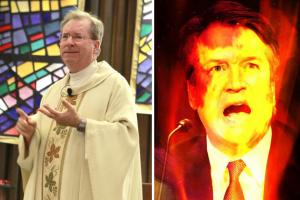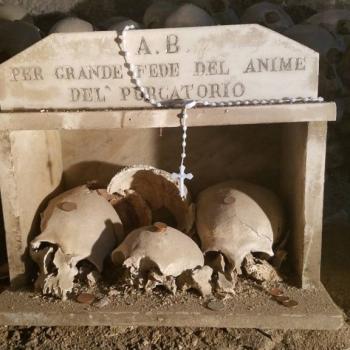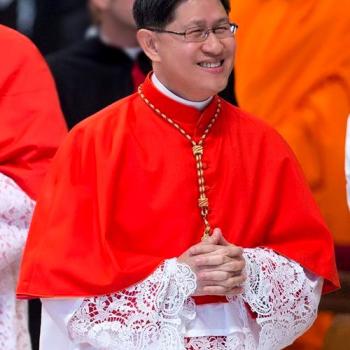
By guest contributor David Metcalfe*
“And therefore, tremble in fear, now, Satan…you corrupter of justice! you begetter of death! you betrayer of the nations! you robber of life! …I adjure you, ancient serpent…” – Father Merrin in The Exorcist by William Peter Blatty
Throwing caution to the wind last week, Father Gary Thomas, an exorcist assigned to the Archdiocese of San Jose’, danced right out into the devil’s playground – entering the U.S. political fray with a questionable comment on the rights of self-proclaimed witches to free speech in their magical activism.
Catland Books, a Brooklyn-based metaphysical shop, has been running a heavy play for PR tied to tensions between conservative and liberal political groups during the so-called ‘Trump era.’ Their most recent agitprop activity is a Kavanaugh-themed continuation of the ‘Hex Trump’ meme in which the store has played a central supporting role – and it should be noted this role includes utilizing ‘Hex Trump’ as a fundraising opportunity for the social causes they support.
To combat this millennially motivated media coup, conservative Catholic Fr. Thomas is putting on some spiritual theatrics of his own with a public Mass to protect Kavanaugh. An already antagonistic and political act in this context, he made it even more polemical while doing his PR rounds where he’s quoted calling into question whether the ‘conjuring of evil’ falls under free speech.
It’s an odd line to take in light of U.S. Attorney General Jeff Sessions recent push to highlight religious liberty legislation, and an even odder one considering Fr. Thomas’ ecclesiastical vocation of exorcist – where conjuring evil is written into the rite!
BBC News reports that Thomas said ‘”This is a conjuring of evil – not about free speech.” The Hill reports him saying, ‘“Conjuring up personified evil does not fall under free speech.” For our purposes in examining Thomas’ faux pas this is an important distinction to parse, but not before we draw attention to the tricksterish fact that in the era of instant recording two large news outlets quote him saying two different things.
The first version places him in the awkward position of summoning up the spirit of past inquisitions, with his words edging close to sounding like sentiments popular during the 16th century witch craze in the UK that led to the English Parliament’s establishment of the Witchcraft Act – as the UK parliamentary website explains*:
In 1542 Parliament passed the Witchcraft Act which defined witchcraft as a crime punishable by death. It was repealed five years later, but restored by a new Act in 1562. A further law was passed in 1604 during the reign of James I who took a keen interest in demonology and even published a book on it. The 1562 and 1604 Acts transferred the trial of witches from the Church to the ordinary courts.
In terms of Thomas’ vocational position, the BBC News quote at least provides him with a context of healthy respect for the efficacy of exorcism and the attendant efficacy of malefic practices. That focus on efficacy, however, when brought to a political level becomes extremely toxic and is at the root of the kind of witchcraft panics we still see in many parts of the world – panics in which people are socially isolated, targeted with violence, and at times killed. With the potential for bloodshed hovering around these ideas, it is always sad to see official figures like Thomas stumbling blind into making provocative statements to the media.
The quote from The Hill is a bit more complicated. In saying that ‘conjuring up personified evil does not fall under free speech,” we’re left with the question of what legal distinction such a conjuring would fall under. This quote implies a sense of criminality to the act which awkwardly puts Thomas in league with those seeking to hex political figures, simply because one of the actions during an exorcism is in fact to conjure the devil/demons/possessing entity!
As Dr. Francis Young points out in his book, A History of Exorcism in Catholic Christianity:
“Christian exorcism, like Christian prayer, is founded on an underlying belief in the power of an omnipotent God. Unlike prayer, however, exorcism involves an adjuration or direct imperative speech directed towards spiritual beings other than God, saints and angels. Where prayer is supplicatory, exorcism is imperative. Differentiating exorcism from magic is notoriously difficult, and depends to a large extent on the definition of magic adopted.”
He goes on to explain that, “the Latin word exorcizo, a direct borrowing from the Greek, originated in legal terminology; its ultimate root was the Greek horkos, ‘an oath.’ To exorcise, in its Greek and Latin legal meanings, meant ‘to swear an oath,’ and in Latin became almost synonymous with coniuro, ‘to take an oath together.’ However, over time the compound verb coniuro was used as an intensified form of the verb iuro, ‘I swear,’ and in late Latin it came to have the sense of ‘beg’ or ‘implore.’
The medieval Latin coniuro produced the English word ‘conjure,’ whose original legal and religious sense has now been replaced almost completely by its magical sense (which always existed alongside the other meanings).” Echoing here our concerns over Thomas’ statements, Dr. King also highlights that “the difficulty of separating exorcism from magic therefore occurs at the linguistic level; ‘conjuration’ is an activity of the magician and exorcist alike.” It seems that in boldly bringing freedom of speech to play Thomas has ignored this contextual ambiguity in the hopes of hijacking Catland’s PR, to his own detriment and the detriment of his vocation as an exorcist.
Perhaps the most ironic part of all, the entire thing seems to be little more than a bit of clever media manipulation for the purposes of activism – Fr. Gary Thomas, the well publicized exorcist, appears to have found himself in a scene similar to Fr. Karras’ first interview with the possessed Regan in The Exorcist, in the place of a priest who has lost his faith in the simplicity and directness of the Gospel becoming enmeshed in a manipulative exchange with the devil. Thomas should know that Satan is the Prince of the World, and that politics are his well-trod playground.
Keeping this conversation in the realm of magic and mystical rites is rather dishonest and puts Thomas and his vocation at a disadvantage, since both parties are simply playing with information warfare techniques on one level or another. As Dakota Bracciale, co-owner of Catland Books, openly admits in the BBC News feature,
“[We see] the witch as a political figure who threatens and works to take down the patriarchy. This has been seen throughout history, but more recently in American society. We uphold this legacy which merges art, political theatre, religious iconology and socio-political resistance.”
Which is to say – this isn’t witchcraft as religious historians would see it, or even most practitioners of traditional faiths around the globe would see it, so much as a weaponized use of cultural stereotypes and media for activist aims – and Thomas has tossed out a rebuttal that shows that he may believe in his vocation as a political mouthpiece and PR rep over his actual vocation of exorcism, that he may not even know how to properly conduct the Rite based on his politicized statements, or that he’s willing to sidestep the power of divinity in order to form the kind of alliances between the Church and civil authorities that historically led to violent persecution.
None of these options is very appealing in a public representative for an organization currently embroiled in a global scandal involving corruption, political manipulation and systematic physical and spiritual abuse. If these exorcists were trained to stick to their exorcisms rather than puffing around the PR circuit during times of trouble maybe they might drive out the demons from their own den. Until the it’s just more fodder for the diabolic media machine which is breeding antagonism and division in our global society – and to all the folks feeding this rampant beast, whether they’re priests, pagans, or PR hungry pedants I say a hearty:
VADE RETRO SATANA.
*David Metcalfe is a researcher, writer and multimedia specialist focusing on the interstices of art, culture, and consciousness. In 2011 he established the Liminal Analytics: Applied Research Collaborative to focus on testing and deploying a unique combination of applied scholarship, market intelligence, digital media and social network development in order to build strategic multidisciplinary lines of communication.
He is a contributing editor for a number of popular web magazines dealing with alternative culture and is currently working on a long-term transmedia project with Dr. R. Andrew Chesnut to document the growth and global market presence of devotional traditions associated with Santa Muerte, and the sanctification of death, in the Americas.













